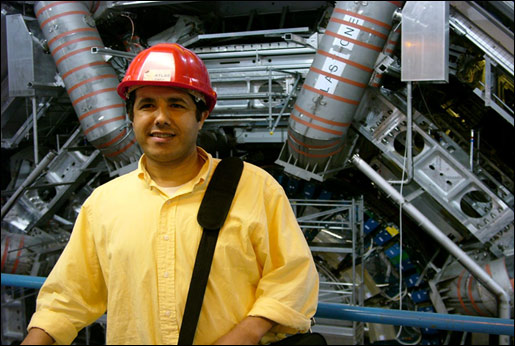
ATLAS e-News
23 February 2011
3 March 2008
Kamal Benslama
Nationality: Moroccan
 Kamal Benslama
Kamal Benslama
Kamal Benslama is a young professor of physics leading the ATLAS-Regina group, a recently formed and international high energy physics research team at the University of Regina in Canada. The group was set up in 2006, and all its members - Kamal, post docs, graduate and undergraduate students are devoting their efforts to the ATLAS detector. Their research operates on two fronts: the Liquid Argon calorimeter and the High Level Trigger.
Kamal’s strong ties with ATLAS are not new: he joined the ATLAS collaboration right at the beginning of the adventure - in 1992 - when he was a member of the RD2 project to evaluate the feasibility of a silicon tracker and/or preshower detector for LHC. As part of his M.Sc. at the University of Geneva, Kamal’s research was focused on the readout system of the silicon detector.
High energy physics has led Kamal to travel far and wide in order to forge a successful career in the field. A native of Morocco, Kamal moved to Switzerland to start a physics degree at the University of Geneva. As an undergraduate, he visited CERN for the first time on a trip with his university mates: “The visit made me decide what I wanted to do with my career,” he remembers. “How can you come to CERN and not be impressed?”
He remained in Switzerland, a country that he loves and considers his homeland, to get a PhD in neutrino physics at Lausanne University. Then he moved to North America. First, Kamal worked as a post-doc on the CLEO experiment at Cornell, later he became a research scientist on ATLAS with Columbia University. While in New York, he was involved in the testing and production of the front end electronics of the liquid argon calorimeter.
After all the travelling, Kamal is currently living in Regina, a small city in Canada, with his wife and two young sons. Although he feels lucky for the great opportunity that Regina University is offering him, Kamal misses Switzerland and the unique atmosphere at CERN. Every time he lands at Geneva airport, Kamal experiences the same joy of his first trip to Geneva almost 18 years ago. The feeling of excitement, he says, is due to returning to such a beautiful country and also to the prospect of doing physics at CERN.
With the LHC about to start, Kamal is looking forward to contributing significantly to the first physics results: “We have been waiting for 15 years for this,” he says.“This is an exciting time for me and for everyone within the ATLAS collaboration.”
Kamal would like to see the Higgs particle coming out to confirm how beautiful the standard model is, but, as with the rest of the high energy physics community, he also wants to see something beyond the SM “New findings will keep our field alive,” he says. This, he thinks, will help physicists who want to work in particle physics have more research opportunities. At the moment, Kamal considers it is not easy to find opportunities that allow researchers to stay in the field. “Anyway, whatever we will find, particle physics may be entering the most glorious epoch of its history.”
When asked about his hobbies, Kamal laughs: “Well, I have two young kids!” Nowadays, all the free time he has he tries to spend it with them. With such a dedicated father, it is not difficult to imagine that they may become physicists themselves one day, but Kamal is clear about this: “They should study what they like, as long as they do whatever they want the best way they can, everything will be fine.”
Just before one of Kamal’s trips to CERN from Canada, his three-year old son asked him: “Daddy, are you going to see particles?” Not right away, but hopefully Kamal and the rest of the ATLAS collaborators will see new particles coming out soon.
